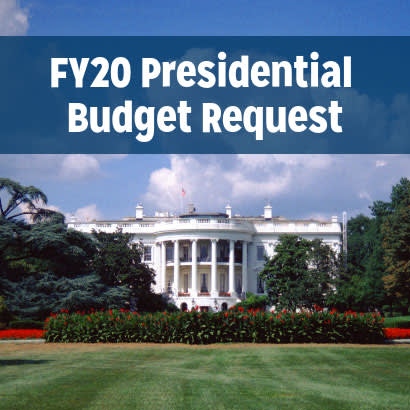
The White House released its FY20 budget request this week, kicking off debate for the next budget cycle. Although Congress passed a final budget agreement for FY19, ending the long government shutdown just weeks before, the release of the President’s budget is traditionally intended to set the tone for budget negotiations by Congress for the next fiscal year. Much like President Trump’s budget proposal last year, which was largely ignored by Congress (President proposes, Congress disposes as the saying goes), this budget request is assumed to be “dead on arrival.” Even so, we can’t help but feel skittish when reading the fine print, and a decent amount of déjà vu at the proposed cuts and eliminations we all worked so hard over the past two years to oppose.
Department of Health & Human Services (HHS): Proposed $1.2 billion cut from the Centers for Disease Control and Prevention (CDC), including $237 million from the Chronic Disease Division that houses the Arthritis Program. Further, the budget would create a block grant intended to provide states with flexibility to address chronic disease programs as they see fit. Such a proposal would almost certainly disadvantage smaller programs like the Arthritis Program, and could jeopardize the future of the program altogether.
Department of Education: Proposed elimination of the 21st Century Community Learning Center (21st CCLC) Program, the only federal funding stream available to support out-of-school time programming. The current federal investment in afterschool programming is modest, but it is absolutely vital to families and communities across the country, supporting afterschool and summer learning for almost 2 million children.
Although 21st CCLC is designed to support STEM (science, technology, engineering, math) educational opportunities in afterschool programs, the Administration has separately proposed $200 million in grants to support teachers in developing STEM programs, including adding $13 million to an existing career and technical education grant program to send $20 million in grants for CTE programs that emphasize STEM.
To learn more about opportunities for park and recreation agencies to offer STEM and CTE programs, click here.
Department of Interior: Proposed elimination of the state assistance program of the Land and Water Conversation Fund (LWCF). The Department of Interior argues that the Gulf of Mexico Energy Security Act funds can be used to supplant this cut. With a growing backlog of need and deferred maintenance at all levels of parks, NRPA opposes such cuts.
NRPA members have been fighting for years to get permanent authorization of LWCF, and the bill to make that happen was just signed, but we will still need to work to make sure that these cuts to the State Assistance program aren’t made. For more information, read this Open Space blog post.
Department of Housing and Urban Development: Proposed elimination of the Community Development Block Grant (CDBG) program. Park and recreation agencies have used these funds to provide parks, recreational opportunities and critical programming to low-income communities. Every $1.00 spent on CDBG is leveraged into $3.65 in private and local public funding.
What’s Next?
Fortunately, the advocacy of NRPA’s members nationwide opposing such proposals to cut or eliminate the above programs has proven successful, and these vital federal programs continue to benefit park and recreation agencies across the U.S. Throughout the spring and summer, members of the House and Senate Appropriations Committees will analyze and process the Administration’s budget request, and both houses of Congress will consider bills to fund the government in FY 2020. Your NRPA public policy team will remain focused on getting the above programs and more the funding they deserve for FY2020, while working to educate the Administration on the value of these programs, so that hopefully NRPA members don’t have to feel so skittish come this time next year.
How Can You Help?
Make sure you’re signed up to be an NRPA Park Champion! Park Champions agree to work with their federal elected officials by showing them the impact of the federal programs they vote on — like CDBG, LWCF and 21st Century Community Learning Centers — in their communities. This show and tell model has proven to be incredibly effective. We’d love to add your name to the list of Park Champions!
Click here to learn more about NRPA's advocacy work and learn about the federal policy and legislative issues impacting parks and recreation and what you can do to help advance the interest of parks and recreation in your community and throughout America.


